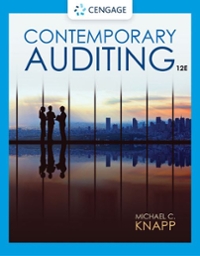So, any good news on the staffing front, Till? Sophie White Eagle asked in between bites of
Question:
"So, any good news on the staffing front, Till?" Sophie White Eagle asked in between bites of a Christmas cookie. "Nope. Still short at least one staff accountant," Tillman Rollins replied glumly before adding, "probably two." Tillman Rollins and his wife were hosting the annual Christmas party for the Big Four practice office for which he served as the managing partner. In the waning minutes of the party, Rollins had called an impromptu meeting of the audit staff's recruiting committee. That committee consisted of Rollins, Sophie White Eagle, an audit manager, and Jerry Martin, a "heavy" audit senior.
"Any chance of borrowing more audit staff from other offices?" Martin asked.
"None," Rollins grumbled. "Everyone's tapped out. We were incredibly lucky to pick up the senior and staff accountant from the Denver office. If Walter Alcorn, the OMP there, hadn't owed me a big favor, we wouldn't have gotten those guys." The practice office overseen by Tillman Rollins was among the smallest of the several hundred Big Four offices scattered coast-to-coast across the continental United States. Located in a remote metropolitan area in the Mountain Time Zone, the office's professional staff consisted of approximately 40 individuals, two-thirds of whom were auditors. The 57-year-old Rollins doubled as the office managing partner (OMP) and director of the audit practice. His two fellow partners included a young audit partner who had recently transferred from the firm's Dallas office and a tax partner who was nearing retirement. Managing the size of his office's audit staff posed a recurring and vexing problem for Rollins. Each year, unforeseen circumstances impacted the ideal size of that staff. In early October, Rollins' office unexpectedly picked up a local bank as an audit client.
Then, in late November, the office's largest audit client, Harsha Manufacturing, requested an "acquisition audit" of a local company it intended to purchase-the client insisted that the one-time acquisition audit be completed by March 15, meaning that it would overlap with the office's busy season. The two new engagements had caused Rollins to scramble to staff his office's year-end audits. Unfortunately, he had come up short, which was forcing White Eagle, Martin, and their fellow auditors to work excessive overtime. Rollins knew the workforce shortage would result in even larger amounts of overtime for his subordinates when the heart of the busy season arrived in a few weeks, and that concerned him greatly.
Tillman Rollins didn't fit the prototype of a Big Four OMP. Despite his seemingly gruff personality that was magnified by his large frame and weather-beaten face-he was the only partner in his firm who owned a working ranch-Rollins was much more paternalistic and approachable than his typical "big city" counterparts. Since being appointed OMP 10 years earlier, he had committed himself to developing close relationships with his subordinates.
Remaining in the position he now occupied for the final few years of his career ranked as Rollins' primary professional goal-he and his wife spent most weekends at their ranch that was located 70 miles from his practice office. Rollins realized if he were replaced as the OMP, he almost certainly would have to transfer to another office hundreds of miles away. He was also well aware that two key metrics that the national headquarters office considered in assessing the annual performance of OMPs was the profitability of the given office and the overall morale of its professional staff. Unfortunately, maximizing those two metrics were often conflicting goals. Excessive overtime increased his office's profitability, for example, while, at the same time, diminishing the goodwill with his subordinates that he had worked so hard to cultivate.
Questions
1. List the key personal traits an office managing partner (OMP) should possess.
List those traits in descending order of importance. Be prepared to defend your choices. Would the list you developed apply equally well to an audit partner? If not, point out how the personal traits an OMP should possess differ from those that should be possessed by an audit partner.
2. A fundamental ethical principle in the AICPA Code of Professional Conduct is "integrity." Did Tillman Rollins act with integrity in his treatment of Eugene Smith? Defend your answer.
3. Would you want to work in a practice office in which Tillman Rollins is the OMP? Explain.
4. After Rollins made the decision to hire Eugene Smith, what measures could Rollins, White Eagle, and Martin have taken to enhance Smith's chances of being successful with the given firm?
Step by Step Answer:






